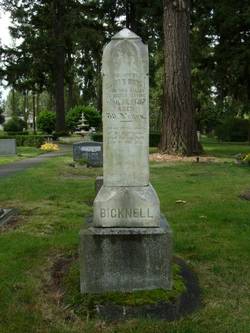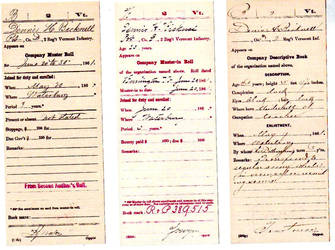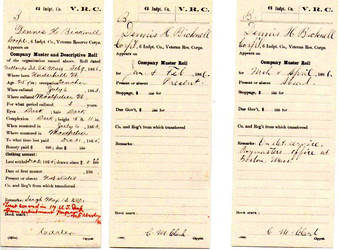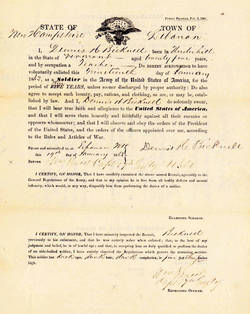Dennis Bicknell
Representing: Union
Unit History
- 2nd Vermont Infantry D
- 17th US Infantry C
- 3rd Regiment Veterans Reserve Corp
- 6th Independent Co. Veterans Reserve Corp
Full Unit History
2nd VERMONT VOLUNTEER INFANTRY
Organized: Spring, 1861 Burlington, VT
Mustered In: 6/20/61 Burlington, VT
Mustered Out: 7/15/65 Washington, D.C.
Discharged: 7/25/65 Burlington, VT
17th UNITED STATES REGULAR INFANTRY
Organized: 7/6/61 Ft. Preble, South Portland, Maine
Mustered In: Inf. Not Avail.
Mustered Out: Active to Date
3rd REGIMENT INVALID/VETERANS RESERVE CORPS
Organized: 10/10/63
Mustered Out: By 12/15/65
6th INDEPENDENT COMPANY INVALID RESERVE CORPS
Organized: 12/1/65 Gallop's Island Boston Harbor, Boston, MA
Mustered Out: 6/1 - 8/31/66 by detachments
Regimental History
REGIMENTAL HISTORY: (2nd)
As indicated by its number, the 2nd, an eastern theater unit, was one the first three regiments raised in Vermont. On 6/24/61 it left the state for Washington City. On the way, while passing through New York it was presented with a stand of colors.
Arriving in Washington the 2nd went into camp on Capitol Hill where it remained until 7/10. It then crossed the Potomac into Virginia, marching through Alexandria to Bush Hill.
On the 16th, the regiment, along with the rest of the army commenced its march to Centerville. Near there on 7/21 it took part in the battle of 1st Bull Run/Manassas before returning to Bush Hill. Battle casualties were 2 men killed; 1 officer and 34 enlisted men wounded plus 1 officer and 30 enlisted men missing.
In August the unit moved northward back across the Potomac for a time before returning to Virginia in September. There it participated in the construction of forts Marcy and Ethan Allen. During this period the "Old Vermont Brigade" was formed. The 2nd would be identified with the Brigade throughout the remainder of its period of service. Picket duty and skirmishing with the enemy filled out the remainder of 1861.
1862. Departing winter quarters in March, the 2nd moved back toward Centerville, VA where they found the cannon that had menaced them all winter were actually "Quaker Guns" constructed of logs. Moving back to Alexandria, the regiment next boarded transports for a short move to Fortress Monroe. Once there it moved into Newport News on the James River.
From Newport News the regiment marched up the Peninsula taking part in fighting at Youngs Mills, Lee's Mills and Williamsburg. In late May the regiment and Union Army crossed the Chickahominy River. After that it did its fair share of fighting during June’s Seven Days Battles.
In September the 2nd took part in the Maryland Campaign which included actions at Cramptom's Pass and Antietam. During the latter action it was on the skirmish line as Confed. Gen. R.E. Lee's troops departed the field. It closed the combat year seeing action during the first battle of Fredericksburg, VA.
In May, 1863 the regiment was active during the second battle of Fredericksburg and Bank's Ford. Then, in August, it moved to New York City to help quell draft rioting.
May, 1864. The 2nd joined Union Gen. U.S. Grant's Overland Campaign as his armies moved southward in to Virginia in what would prove to be The War's final year. Actions ahead included The Wilderness, Spotsylvania, Cold Harbor and before Petersburg.
In mid-year, however, the regiment moved back northward help in the defense of Washington City from the Rebel forces of Confed. Gen. J.A. Early. The threat having passed, it marched back southward into Virginia's Shenandoah Valley for actions there before heading back to Petersburg.
Shortly after the dawn of 1865 the 2nd participated in the attacks that breached the enemy's Petersburg defenses. It then participated in the following of Lee's retreating forces seeing its final major action at Sailor's Creek.
Participation in the Grand Review preceded final muster and disbandment.
Regimental losses: 6 officers killed or mortally wounded; 0 officers died of disease, accidents, etc.; 218 enlisted men killed or mortally wounded; 175 enlisted men died of disease, accidents, etc.
Soldier History
SOLDIER: (2nd)
Residence: Stowe, VT Age: 23. + Yrs.*
Enlisted/Enrolled: 5/7/61 Waterberg, VT Rank: Pvt.
Mustered In: 6/20/61
Transferred Out: 6/8/63 Ft. Preble
Highest Rank: Pvt.
SOLDIER: (17th)
Residence: Stowe, VT Age: 23+ yrs.
Enlisted/Transferred In: 1/19/63 Lebanon, NH Rank: Pvt.
Discharged: 6/8/63 Ft Preble, Portland Harbor, ME
Highest Rank: Pvt.
SOLDIER: (3rd)
Residence: Stowe, VT Age: 24+ yrs.
Enlisted/Enrolled: 7/6/63 Montpelier, VT Rank: Cprl.
Mustered In: 7/6/63 Montpelier, VT
Transferred Out: 12/65
Highest Rank: Cprl.
SOLDIER: (6th)
Residence: Stowe, VT Age: 24+ yrs.
Transferred In: 12/63 Rank: Cprl.
Mustered Out: 7/5/66 Boston, MA
Highest Rank: Cprl.
Family History
PERSONAL/FAMILY HISTORY:
*NOTE: For years Dennis H. Bicknell believed he had been born in 1838. As we shall see, years later, in hindsight, he would learn his birth year was actually 1842. The month was November. The date was the 11th. The location was likely Underhill (Center), Chittenden County, Vermont as that is where the 1850 U.S. Census tallied the Bicknell family.
Dennis' parents were George (b. 1805 NH) and Laura (nee Whitten b. 1814 VT) Bicknell. As of 1840 George's occupation was "carpenter.
All Dennis' known siblings were younger than he. They were Adelin E. (Adeline?) (b. 1839 VT), Clinton George/George Clinton (b. 1844 VT), Laura A. (b. 1847 VT) and Preston F. (b. 1853, VT). It is very possible that brother Preston was a half sib to Dennis because, as of 1860, the family matriarch had become Sarah W. (b. 1814 VT), rather than Laura Bicknell. The fate of Laura is not documented.
At the time of the 1860 U.S. census the Bicknell's were still in Vermont, but by then residing in or near the community of Stowe located in Lamoille County. The elder George then listed his area of employment as "mechanic".
Nothing is documented pertaining to Dennis' childhood and formative years. It appears likely, however, that he received a substantial primary education as, of 1855, '56 and '57 he was attending the University of Vermont. And, as of 1861, when he enlisted in the U.S. Army he listed his occupation as "teacher."
Although residing at the time in his father's Stowe, Vermont home, on 5/7 or 20/61, in Waterbury, VT Dennis entered a three year enlistment in the Second Vermont Infantry. His unit of service was Company "D". At enlistment Private Bicknell's vital statistics - beyond his being a teacher - were as follows: Age 23; Height 5’11 ½ “ ; Eyes dark; Hair dark; Complexion dark. For enrolling to serve his country during its time of civil war he received a $100 bonus or "bounty", a portion of which was paid up front with the balance to be meted out in later increments.
On 6/20/61 after formally being mustered into Federal service, the 2nd, including Private Bicknell departed Vermont and moved to "the front." Thereafter -with the exception of the 1st battle of Bull Run/Manassas (July, 18) until June, 1862 he participated in every action undertaken by his unit. The Bull Run/Manassas exception was because, at the time of that clash he was on "detached" duty for several days attending to regimental stores with the brigade quartermaster.
It appears that at some point during July or August, 1861 Private Bicknell was promoted from the rank of private to corporal, However, the closing months of '61 proved to be somewhat rocky for the new corporal as on 10/10 he was subjected to a regimental court martial (trial) for some undocumented infraction. Out of this came an $8 fine, somewhat of a princely sum in a day when a private soldier's monthly pay was $13. Also, he was apparently reduced in rank back to being a private.
Following this came a few weeks being excused from duty because of a severe cold and catarrh (infection) contracted while serving on picket duty at Camp Griffin, VA. This illness appears to have resulted in his hospitalization in the regimental hospital.
Recovering from the catarrh in early 1862, all seemed to go well until June of that year during Union General George W. McClellan's Peninsula Campaign in Virginia. In later years former soldier Bicknell would describe matters in this manner. "On or about the last day of June during the seven days battles I was partially disabled by exposure and fatigue. That was especially so during the last night's march (from Malvern Hill) to Harrison's Landing (on the James River). I would never completely recover (from that experience).
I (had) tried to take care of my health as best as possible, but the exposures of camp life on the Chickahominy (River in VA) near Richmond began to take a toll on me.
I remember that I was "sun struck" while on duty and only saved my life by prompt action to prevent (the) usual effects (of that condition)....For several years thereafter I was more or less affected by it (the sun stroke) especially in warm weather.
During that last night while marching from Malvern Hill toward the James River I was attacked with violent pain in the stomach and bowels and was unable to go on. I stepped out of the ranks and lay in the forest by the roadside until morning (when) I was able to go on. I found my regiment early in the forenoon. I was then comfortable for two or three days but then began having swollen limbs and a general heaviness of my system throughout (including) pain in my liver and indigestion. This continued with some severity for a week a week or more until the symptoms began to improve."
In July, 1862 Corporal Bicknell was first hospitalized in the regimental hospital for rheumatism. Next, during the same month, came hospitalization for inflammation in one of his knee joints. Additional hospital time for diarrhea closed out the month followed by more hospitalization for rheumatism the first of August. Another hospitalization for icterus (jaundice) followed.
Bicknell, again, picks up the story. "While our regiment was in camp at Harrison's Landing an order arrived for two commissioned officers from each regiment and one enlisted man from (each) company to be detailed for recruiting service in Vermont. The detail, I feel confident, was made up of those considered partially disabled for duty at the front....I was the enlisted man from company "D". We proceeded to Vermont in August."
In January (1863) our detail was ordered back to the front. On our return while at White River Junction, VT we were met by an officer of the regular army, a Captain Sweet, who transferred a number of us from our regiment to the 17th United States infantry. There were orders in force at the time allowing such transfers for the purpose of filling up the regular army. I was not in good health and thought it would be better for me to be transferred. I then proceeded to the headquarters of the regiment (17th) at Ft. Preble, Portland Harbor, Maine."
Now a member of Company "C", 2nd Battalion, 17th regiment U.S. Army Infantry Private Bicknell found his physical condition not improving. Thus, he requested that he be examined by a surgeon. This having been done on, 5/26/63 the examining surgeon wrote as follows: "I have carefully examined Dennis Bicknell a private in Capt. Prime's company and found him incapable of performing the duties of a soldier due to organic disease of the brain." Thus, on 6/8/63 Private Bicknell was granted a medical discharge from the U.S. Army because he had been unfit for duty during the previous two months.
Exiting the military Dennis returned to his father's (Stowe), Vermont home. He did not remain there long, however, as on 7/6/63 in Montpelier, Vermont he re-enlisted to serve his country for another three years. On this occasion his unit was the 3rd Regiment Invalid/Veteran Reserve Corps. His rank was corporal.
While in the IC/VRC Corporal Bicknell's duty stations included Brattleboro, Vermont, Concord, New Hampshire, Boston, Massachusetts, and, finally, Gallupe's Island located in the harbor of Boston, Mass. Still, although not in the front lines of combat his physical condition still did not improve as "I continued to have bilious relapses of greater or lesser violence. Finally, (in September, 1865) I was obliged to ask for a furlough to recuperate my health. Granted leave "I was barely able to get to (my) father's home in Vermont, but was benefited by the (three weeks) of rest and change."
Returning to duty on Gallup's Island in the harbor of Boston, MA near the end of 1865, Corporal Bicknell completed that year and entered in 1866 on detached service at the Boston paymaster's office. There, he served as orderly for the post's lieutenant colonel until final muster on 7/5/66.
***********************************************************************************************
With service to his country behind him Dennis returned to Vermont to try and put his life back together as a civilian. That, as he later recounted, was not to prove easy as between his return date and January, 1868 he was unable to engage in any business except "some teaching amounting to a total of four months".
By January, 1868 Dennis was residing in the community of Hyde Park Lamoille County, Vermont. Then and there he accepted a job reporting for and doing some light printing duties for the local Lamoille News newspaper. In doing so, however, he later pointed out that this was not at all the type of work he would have undertaken had he been in good health.
The winter of 1869/’70 saw Dennis teaching for a grand total of two months. More importantly, however, was the fact that on January 1st, 1870 in Hyde Park he wed. His bride was Naomi H. Abercrombie (b. 4/15/37 (1840) Canada). It appears the couple - at least for a short time - initially settled in Norwich, Windsor County, VT.
[Ed. Note: The union of Dennis and Naomi would produce one child, a son born in Vermont whom they named George. The only documental information on George comes from a Minnesota Territorial State Census conducted in 1885. As George is not noted in the 1880 census, he was obviously born sometime within the five years of 1880 to 1885. Further, he likely did not live long, as beyond 1885 there is no mention of him.]
Dropping back to 1870, as of some date within this year, despite continuing bilious troubles and indigestion, Dennis thought himself strong enough to commence working in a profession for which he had made preparations as far back as prior to The War. The profession, which Dennis would ply for the remainder of his life, was that of a clergyman.
Based on available documentation it would appear that the Reverend Bicknell's calling in the clergy was of an itinerant preacher as in the years ahead the Bicknells would frequently move. For example from April, 1870 to April, 1871 the reverend noted that he resided in Union Village Orange Co., VT. Then, from April, 1871 through April, 1874 they were in Albany Center Orleans Co., Vermont while in April, 1874 they moved to Colchester Chittenden Co., VT where they appear to have remained until April, 1877. He later noted that during the following year they resided in "no steady" location. Instead they lived in a number of locales including not only Colchester and Jerich in Vermont, but, during the winter, in Kinsey P.2., Canada. During that period their postal address was Syndenham Place, Mississauga, Ontario Canada. Further, from April, 1878 through April, 1880 their community of residence once again in (North) Hyde Park, VT.
During the decade of the 1880s the Bicknell's continued their moves. From April, 1880 through April, 1883 they were in Shelton, Franklin County, VT. They then moved to Breckenridge located in Wilkin County, Minnesota where they resided from May through October when they then moved to St. Charles, Winona County within that state.
On March 4, 1886 the Bicknells were still residing in St. Charles. That is when and where the former Civil War soldier began the paper chase in an effort to obtain a government disability pension based on the continuing illnesses he traced back to his time of soldiering.
During the process the former U.S. private noted that he had been a healthy man when he enlisted, but then related the wartime events described earlier here in the volunteer army, regular army and the VRC. He then went on the report that since The War has had to altogether discontinue his clergy work for one year and at no time has been strong enough to work more than half time. Finally, he detailed how various doctors treated him for liver disease.
On 3/10/90 a pension stipend in the amount of $4 per month was granted. The grant was based on disease of the liver and other liver-related conditions. By Mr. Bicknell's death date the monthly stipend had increased to $6 per month.
Based on available documentation, sometime circa 1887 the Bicknells departed Minnesota and moved the Puget Sound area of western Washington Territory. As is often the case, what drew the Bicknells from Minnesota to this far northwest area of the country is not documented.
What is documented is that as of 1889 the family was residing in the eastern King County community of Houghton (now part of Kirkland) where Dennis was once again plying his trade as a printer. The census of the following year had the Rev. Dennis Bicknell still in that area of King County, but with the address clarified as the Redmond Township community of Kirkland.
During December, 1896 the Reverend Bicknell's health - which post-war had never been good - markedly deteriorated. The physician who had treated him since he and Naomi's move to King County first thought the reverend was suffering from an advanced case of dropsy, but found his condition to be much worse. The doctor last saw Reverend Bickell alive on 1/3/97 and later noted: "He had a marked cachectic appearance. No solid food could be taken. He complained of severe pain in the region of the stomach and generally throughout the (body) trunk. The stomach was swollen."
The doctor continued: "The patient vomited a very dark coffee-ground appearing mass of about 1 (one) quart. (It was) broken down tissue of some sort mingled with dark blood. (This was) repeated on the 6th followed by (a) like discharge from the bowels. (This was) likely cancer of the stomach."
Former Civil War soldier, The Rev. Dennis H. Bicknell died on 1/10/97. Three days later he was buried in the Kirkland Cemetery.
***********************************************************************************************
Following Dennis' death Naomi Bicknell began the paperwork to collect at least a portion of her late husband's pension. Such was granted on 11/30/97. The initial amount of the stipend is not known. Further, it is unclear if the final payment she received in 1913 was either $4 per month or $12 per month.
As far as Naomi's residential whereabouts during her final years of life, the 1900 census found her in Kirkland as a boarder in the home of one Jesse H. Paille and family. The population tally a decade later again found her still in Kirkland, but apparently by this time, living alone.
According to the Seattle, Washington City Directory for, by that year the widow Bicknell had departed Kirkland and was living at 1613 40th Ave North, Seattle. Exactly when she had moved westwardly across Lake Washington is not documented. Further, her connection to the Seattle address is not known. Shortly thereafter, however, at the time of her death she had moved back to the eastern shores of Lake Washington.
Naomi H. Bicknell died in Kirkland on 6/11/13. She was buried beside Dennis in the Kirkland Cemetery.
Cemetery
Buried at Kirkland Cemetery



